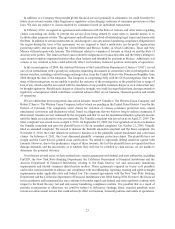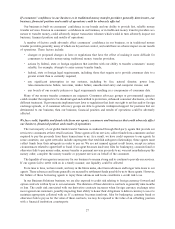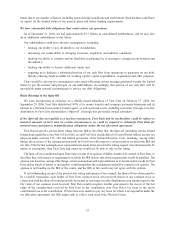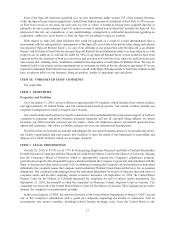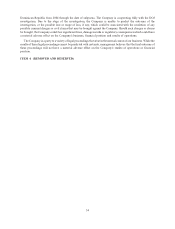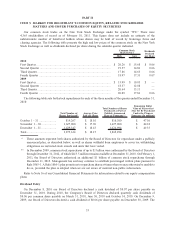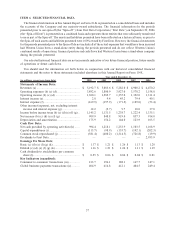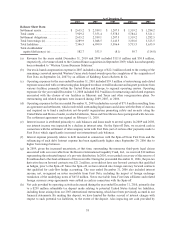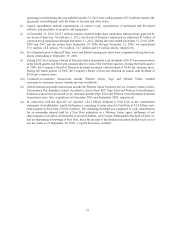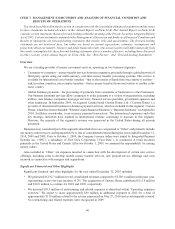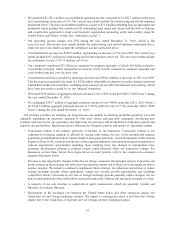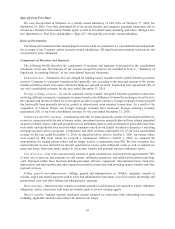Western Union 2010 Annual Report Download - page 34
Download and view the complete annual report
Please find page 34 of the 2010 Western Union annual report below. You can navigate through the pages in the report by either clicking on the pages listed below, or by using the keyword search tool below to find specific information within the annual report.future due to any number of factors, including general market conditions and credit issues. Such declines could have
an impact on the funded status of our pension plans and future funding requirements.
We have substantial debt obligations that could restrict our operations.
As of December 31, 2010, we had approximately $3.3 billion in consolidated indebtedness, and we may also
incur additional indebtedness in the future.
Our indebtedness could have adverse consequences, including:
• limiting our ability to pay dividends to our stockholders;
• increasing our vulnerability to changing economic, regulatory and industry conditions;
• limiting our ability to compete and our flexibility in planning for, or reacting to, changes in our business and
the industry;
• limiting our ability to borrow additional funds; and
• requiring us to dedicate a substantial portion of our cash flow from operations to payments on our debt,
thereby reducing funds available for working capital, capital expenditures, acquisitions and other purposes.
There would be adverse tax consequences associated with using certain earnings generated outside the United
States to pay the interest and principal on our indebtedness. Accordingly, this portion of our cash flow will be
unavailable under normal circumstances to service our debt obligations.
Risks Relating to the Spin-Off
We were incorporated in Delaware as a wholly-owned subsidiary of First Data on February 17, 2006. On
September 29, 2006, First Data distributed 100% of its money transfer and consumer payments businesses and its
interest in a Western Union money transfer agent, as well as related assets, including real estate, through a tax-free
distribution to First Data shareholders (“Spin-off ”) through this previously owned subsidiary.
If the Spin-off does not qualify as a tax-free transaction, First Data and its stockholders could be subject to
material amounts of taxes and, in certain circumstances, we could be required to indemnify First Data for
material taxes pursuant to indemnification obligations under the tax allocation agreement.
First Data received a private letter ruling from the IRS to the effect that, the Spin-off (including certain related
transactions) qualifies as tax-free to First Data, us and First Data stockholders for United States federal income tax
purposes under sections 355, 368 and related provisions of the Internal Revenue Code, assuming, among other
things, the accuracy of the representations made by First Data with respect to certain matters on which the IRS did
not rule. If the factual assumptions or representations made in the private letter ruling request were determined to be
untrue or incomplete, then First Data and ourselves would not be able to rely on the ruling.
The Spin-off was conditioned upon First Data’s receipt of an opinion of Sidley Austin LLP, counsel to First Data, to
the effect that, with respect to requirements on which the IRS did not rule, those requirements would be satisfied. The
opinion was based on, among other things, certain assumptions and representations as to factual matters made by First
Data and us which, if untrue or incomplete, would jeopardize the conclusions reached by counsel in its opinion. The
opinion is not binding on the IRS or the courts, and the IRS or the courts may not agree with the opinion.
If, notwithstanding receipt of the private letter ruling and opinion of tax counsel, the Spin-off were determined to
be a taxable transaction, each holder of First Data common stock who received shares of our common stock in
connection with the Spin-off would generally be treated as receiving a taxable distribution in an amount equal to the
fair value of our common stock received. First Data would recognize taxable gain equal to the excess of the fair
value of the consideration received by First Data in the contribution over First Data’s tax basis in the assets
contributed to us in the contribution. If First Data were unable to pay any taxes for which it is responsible under the
tax allocation agreement, the IRS might seek to collect such taxes from Western Union.
32





